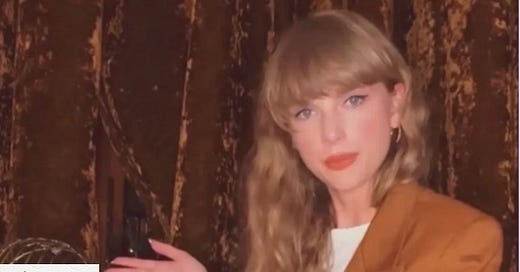Basic Bitch Edition, Part I
The intelligentsia's self-appointed Taylor Swift interpreter weighs in
If one song captures my feelings about the whole Midnights enterprise, it’s “Maroon.” I don’t think it’s very good, but I still want to listen to it. Its vaguely opiated midtempo moodiness is bland but palatable. Swift shows off her vital eye for detail and scene, flaunts her narrative inversions and wordplay: incense turns to ash, a beginning turns to an ending, laughter to tears.
And so despite my qualms, I’m lanced by the errant affair between two young people that probably never should have happened and wasn’t that big of a deal in the first place. At this point it’s hard to say whether Swift’s obsession with the losses and wounds that emotionally mature adults slough off is sales calculus or a psychological problem. If it’s the latter, however, it’s a problem that I and many of her other fans share, allowing minor events to harden into cryptic emblems of one’s intractable flaws or the rough rules of life.
Midnights as an album is imperfect; its rollout has been anything but. The campaign across social media, television, and retail outlets has overshadowed the music. The penumbra is fitting for a wee-hours mood, perhaps, but it makes the record less distinct, just as the hopscotching concept makes it less cohesive. (Yes, friends, you may add Midnights to the illustrious roster of historic concept albums, alongside Operation: Mindcrime, Dr. Octagonecologyst, and The Kinks Are the Village Green Preservation Society.) Midnights is “the stories of 13 sleepless nights scattered throughout [Taylor’s] life.” Scrambling moments and moods, this retrospective orientation is a clever leveraging of what Swift no doubt would have been doing anyway—picking at old scabs, reliving old grudges, and wondering about what might have been.
The backward glance plays out sonically only a couple times, in the Reputation-era electro of “Vigilante Shit” and the follow-your-dreams pep of “You’re on Your Own, Kid” that channels Speak Now. These interludes are refreshing because Midnights’ agglomeration of good, bad, and indifferent songs is largely mired in its production. I lack the engineer’s ear needed to precisely describe Jack Antonoff’s style, but I can say for sure that here it mostly sucks. Rather than articulate individual tracks, he’s doused it all with his laptop recollections of decade-old Drake and FKA Twigs. You can sway to it, but your limbs are glued to your sides. An album with obvious need for some arena-rocking material—save us Max Martin!—has largely been sculpted into chintzy pieces of white-girl soul.
To be fair, Midnights has produced at least one stadium-suitable track. The record’s consensus absolute #1 killer slay pop jam is the first single, “Anti-Hero.” “I’ll stare directly at the sun / But never in the mirror,” Swift declares in a perfect piece of disingenuity: the song testifies to just how much self-regarding she does in fact do, by now to the schizoid infinite regress that all celebrities ultimately reach, culminating in the mise-en-abyme of the changes she rings on the refrain, “It’s me / Hi / I’m the problem, it’s me.”
I would ascribe similar self-awareness to “Karma,” but apparently I’m alone in this. In the song, Swift piles up absurd metaphors atop the foundationally ridiculous declaration “Karma is my boyfriend”:
Sweet like honey, karma is a cat
Purring in my lap 'cause it loves me
Flexing like a goddamn acrobat
Me and karma vibe like that
If you don’t have fun with these lines, friends, may I introduce you to a little concept called camp? Since she realized her inability to dance was marketable, Swift has been keen to the fact that being cringe is part of her charm.
(As an aside, I’d also like to defend the little-loved song “Question . . . ?” It presents—surprise—two people uncomfortably rehashing a little romantic something that fell apart in some confusing way. The production is corny, the chorus a bizarre-if-compelling take on social insecurity. But I find the song claustrophobic, hinging on Swift’s casual-as-can-be “I just may like some explanations.” . . . If this line fails to send your heart into your throat, dear reader, then I’d like to ask you a question: Have you dated a Sagittarius?)
If Midnights has a core conflict, it emerges from Swift’s inability to set aside the slights and heartbreaks of girlhood while simultaneously grappling with the fact that she’s a grown-ass woman, and a powerful one at that. Her reflections on a money-grubbing future daughter-in-law in “Anti-Hero” are very funny; the domesticity of “Sweet Nothing” is lovely. But things get strange in a couple of places, like “Lavender Haze” and “Midnight Rain,” where Swift expresses anger with men, people, someone expecting her to behave like a wifey. From the former:
All they keep asking me (all they keep asking me)
Is if I'm gonna be your bride
The only kind of girl they see (the only kind of girl they see)
Is a one night or a wife
Given the alpha potency with which Swift has famously managed her career, sentiments like these seem weird; in context, we can only assume they’re archaic. But the record lacks the novelistic articulation to successfully stage them as fragments of the past. If they’re old, they also appear to be at the top of her mind, active in a way that familiar reminiscing about old romances is not. The conflicted contours of what’s jutting out of memory, like the act of reviewing one’s past overall, locates the Swift of Midnights at a crossroads, which also may explain the record’s pervasive lack of bold gesture.
The best or rather most important thing that happens on Midnights takes the form of some unusually direct and moving declarations that occur in its final two tracks. “To you I can admit / I’m just too soft for all of it,” Swift tells her beau at the climax of the light, graceful, gorgeous “Sweet Nothing,” confiding a weariness with the music biz and its “smooth-talking hucksters / out-glad-handing each other.” The story of this album writ large has been all business, so it’s dear to hear Swift admit that even she, indominable and peerless, gets tired of it all. Even she needs a shoulder to lean on—especially one who’s able to gently mock her with the occasional “What a mind.”
Next, finally, is track number 13 (yes, 13), the closer, “Mastermind.” The song enters a rare terrain in Swift’s writing—black comedy. It’s a sinister self-parody wherein the artist is the one mocking herself and her control-freak tendencies, and not so gently. Swift confesses to the object of her affection that their relationship was no mere twist of fate; rather, she ensnared him in a plot as carefully constructed as Midnights’ rollout. “If you fail to plan, you plan to fail,” she intones, like some diabolical admin. “What if I told you I’m a mastermind? / And now you’re mine?” It’s not exactly romance.
When the key skips up at the two-thirds mark, anyone familiar with pop music tingles at the approach of one of Swift’s brilliant bridges. It’s here that she offers a few strange, raw, and chilling lines that cut to the heart of her whole body of work: “No one wanted to play with me as a little kid / So I’ve been scheming like a criminal ever since / To make them love me and make it seem effortless.” For all the apparent vulnerability Swift has shown in her music over the years, she’s always cloaked it in craft—except here, where she makes an uncharacteristically artless declaration of the sort of thing you would honest-to-god never tell anyone.
I’ve never had less trouble believing a line of hers to be drawn from real life. The whole record has been shaken off its pillars a little, and, for me at least, rescued. Knowing when to abandon artistry is, to me, a sign of real art.
Coming Soon
Spigot: Basic Bitch Edition, Part II
Featuring Midnights wine pairings, Tillmans at MoMA, and . . . bonus tracks?




